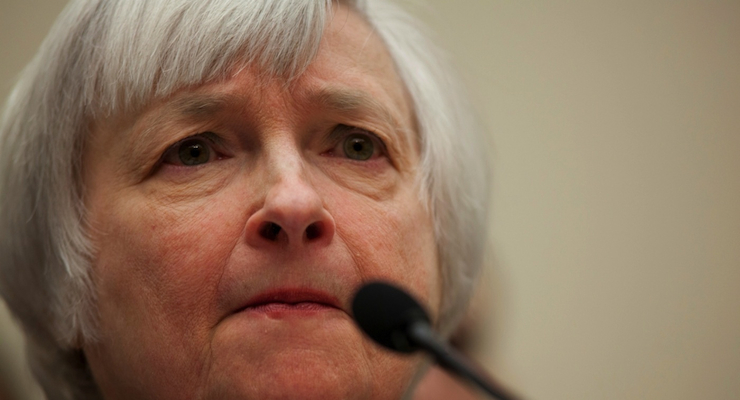

Janet Yellen waits to respond to questions from the House Committee on Financial Services during her first congressional hearing as chair of the Federal Reserve. She delivered the Fed’s semiannual report on monetary policy Tuesday. (Photo: Griffin Moores)
What’s the biggest economic fallacy on the left? What’s the defining mistake for our statist friends? One obvious answer is that many of them hold the anti-empirical belief that the economy is a fixed pie and that one person can’t climb the economic ladder unless another person falls a few rungs.
There’s no doubt that the fixed-pie myth is an obstacle to sound thinking, but I’m wondering whether an even bigger problem is the pervasive belief on the left that there are easy shortcuts to prosperity. Keynesian fiscal policy, for instance, is based on the notion that more growth is just a simple question of having the government spend more money.
And Keynesian monetary policy is based on a similarly simplistic assumption that more growth is generated by having central banks create more money.
To be sure, both policies may seem to work in the short run since people suddenly perceive that they have more money. But perceptions and reality may be different, particularly if the short-run boost in the economy is an illusory bubble.
And that’s why I’m not a big fan of QE-type policies designed to “stimulate” growth with artificially low interest rates.
As I explain in my brief FBN interview with Neil Cavuto this week, any short-run gain is offset by long-run pain.
And I’m not the only one who has a jaundiced view.
The Wall Street Journal also is not happy with the Federal Reserve, opining that the real economy has stagnated as financial assets have been propped up by easy money.
…the Fed has only itself to blame for its economic and political predicament. …One lesson here is that the Fed’s great monetary experiment since the recession ended in 2009 looks increasingly like a failure. Recall the Fed’s theory that quantitative easing (bond buying) and near-zero interest rates would lift financial assets,
which in turn would lift the real economy. …But while stocks have soared, as have speculative assets like junk bonds and commercial real estate, the real economy hasn’t. This remains the worst economic recovery by far since World War II…the economic expectations of Fed Chairs Ben Bernanke and Janet Yellen have been consistently wrong. …the Fed now finds itself caught between a slowing global economy and its promise to begin normalizing rates this year. …One result has been to increase economic uncertainty and market volatility.
Another result is that easy-money policies give politicians an excuse to avoid the real reforms that would boost long-run growth.
I definitely think that’s been a problem in Europe. Politicians keep waiting for magical results from the European Central Bank when the real obstacle to prosperity is a stifling burden of taxation, spending, and regulation.
The bottom line is that politicians all over the world are exacerbating bad fiscal and regulatory policy with bad monetary policy.
To augment this analysis, here’s a video from the Fraser Institute about the insight of Friedrich Hayek, who warned that government intervention, particularly via monetary policy, caused booms and busts by distorting market signals.
Needless to say, last decade’s financial crisis is a case study showing the accuracy of Hayek’s Austrian-school analysis. But politicians never seem to learn. Or maybe they just don’t care. They focus on the short run (i.e., the next election) and it always feels good when the bubble is expanding. And when the government-created bubble bursts, they can simply blame greed, or rich people, or find some other scapegoat (and then repeat the same mistakes as soon as the dust settles).
P.S. For a more detailed look at Austrian economics, check out this lecture. And Austrian-school scholars also have the best analysis of the Great Depression. P.P.S. And for a more conventional critique of easy-money policies, here are some highlights from a speech by a member of the Bank of England’s Monetary Policy Committee.



leon / August 23, 2015
Dude, you just blew my mind.
/